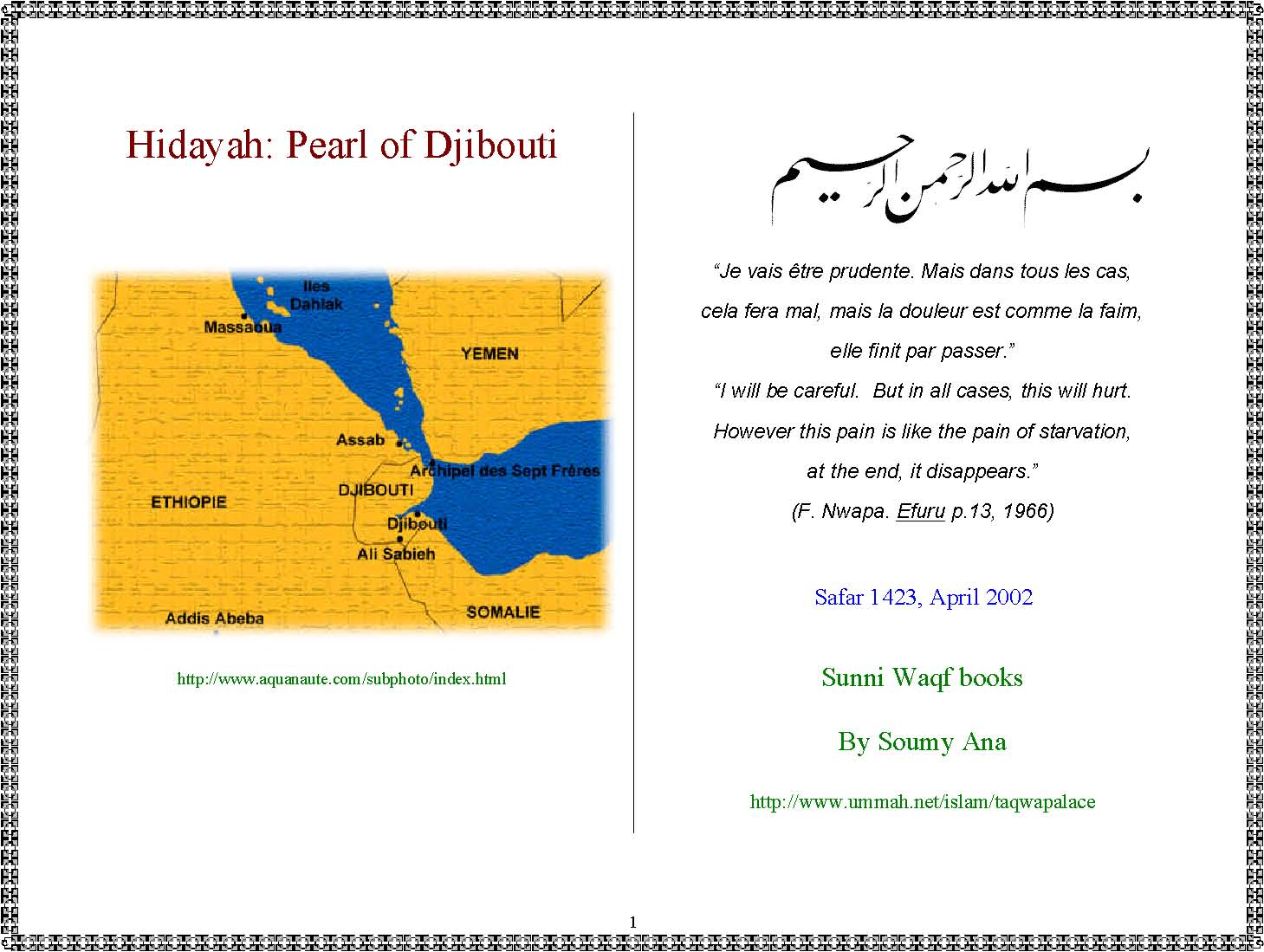Hidayah: Pearl of Djibouti
“Je vais être prudente. Mais dans tous les cas,cela fera mal, mais la douleur est comme la faim,elle finit par passer.”“I will be careful. But in all cases, this will hurt.However this pain is like the pain of starvation,at the end, it disappears.”(F. Nwapa. Efuru p.13, 1966)
Safar 1423, April 2002
http://www.aquanaute.com/subphoto/index.html Sunni Waqf books
By Soumy Ana http://www.ummah.net/islam/taqwapalace
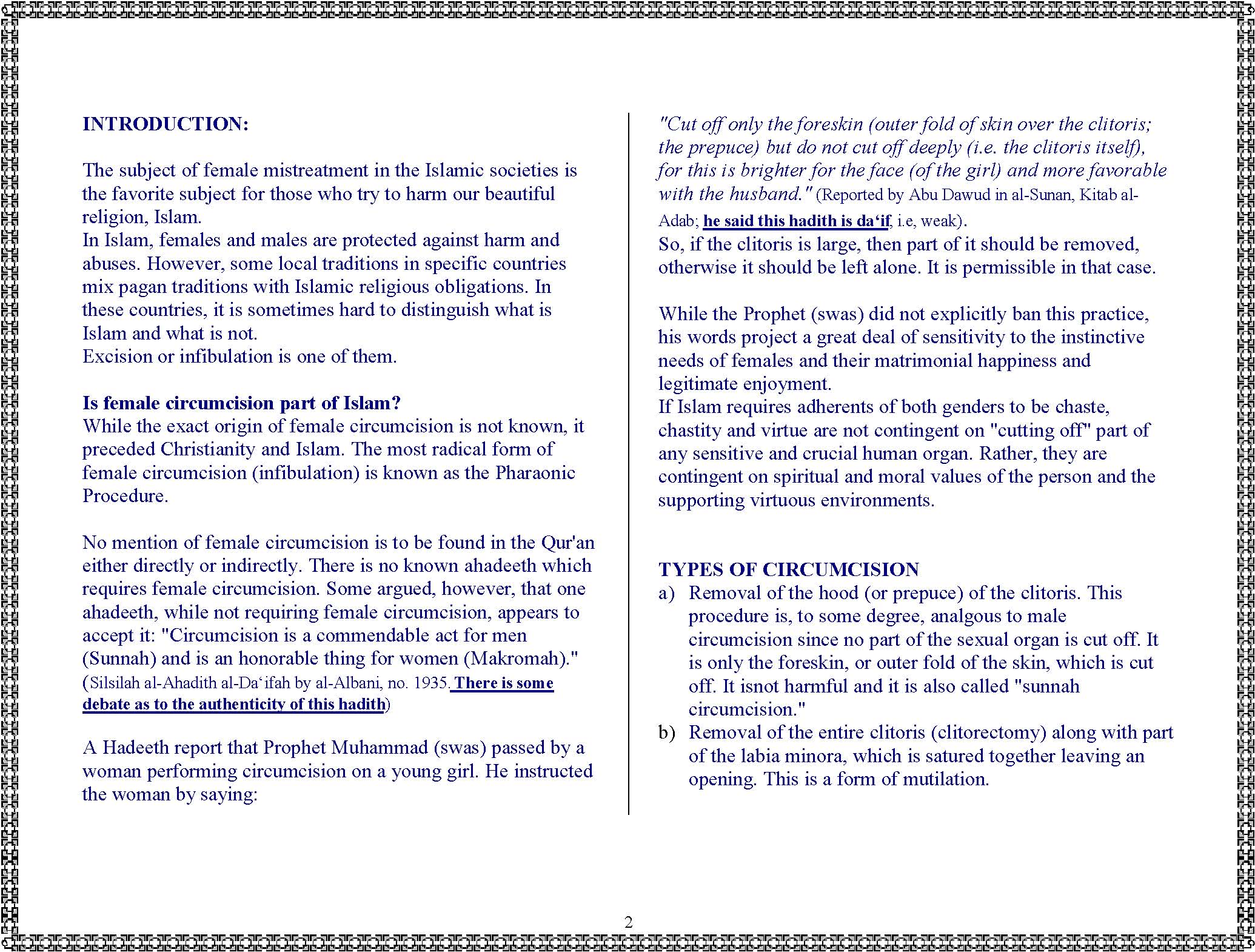
INTRODUCTION:
The subject of female mistreatment in the Islamic societies is the favorite subject for those who try to harm our beautiful religion, Islam. In Islam, females and males are protected against harm and abuses. However, some local traditions in specific countries mix pagan traditions with Islamic religious obligations. In these countries, it is sometimes hard to distinguish what is Islam and what is not. Excision or infibulation is one of them.
Is female circumcision part of Islam?
While the exact origin of female circumcision is not known, it preceded Christianity and Islam. The most radical form of female circumcision (infibulation) is known as the Pharaonic Procedure.
No mention of female circumcision is to be found in the Qur'an either directly or indirectly. There is no known ahadeeth which requires female circumcision. Some argued, however, that one ahadeeth, while not requiring female circumcision, appears to accept it: "Circumcision is a commendable act for men (Sunnah) and is an honorable thing for women (Makromah)." (Silsilah al-Ahadith al-Da‘ifah by al-Albani, no. 1935. There is some debate as to the authenticity of this hadith)
A Hadeeth report that Prophet Muhammad (swas) passed by a woman performing circumcision on a young girl. He instructed the woman by saying:
"Cut off only the foreskin (outer fold of skin over the clitoris; the prepuce) but do not cut off deeply (i.e. the clitoris itself), for this is brighter for the face (of the girl) and more favorable with the husband." (Reported by Abu Dawud in al-Sunan, Kitab al-
Adab; he said this hadith is da‘if, i.e, weak).So, if the clitoris is large, then part of it should be removed,otherwise it should be left alone. It is permissible in that case.
While the Prophet (swas) did not explicitly ban this practice,
his words project a great deal of sensitivity to the instinctive
needs of females and their matrimonial happiness and
legitimate enjoyment.
If Islam requires adherents of both genders to be chaste,
chastity and virtue are not contingent on "cutting off" part of
any sensitive and crucial human organ. Rather, they are
contingent on spiritual and moral values of the person and the
supporting virtuous environments.
TYPES OF CIRCUMCISION
a) Removal of the hood (or prepuce) of the clitoris. This procedure is, to some degree, analgous to male circumcision since no part of the sexual organ is cut off. It is only the foreskin, or outer fold of the skin, which is cut off. It isnot harmful and it is also called "sunnah circumcision."
b) Removal of the entire clitoris (clitorectomy) along with part of the labia minora, which is satured together leaving an opening. This is a form of mutilation.
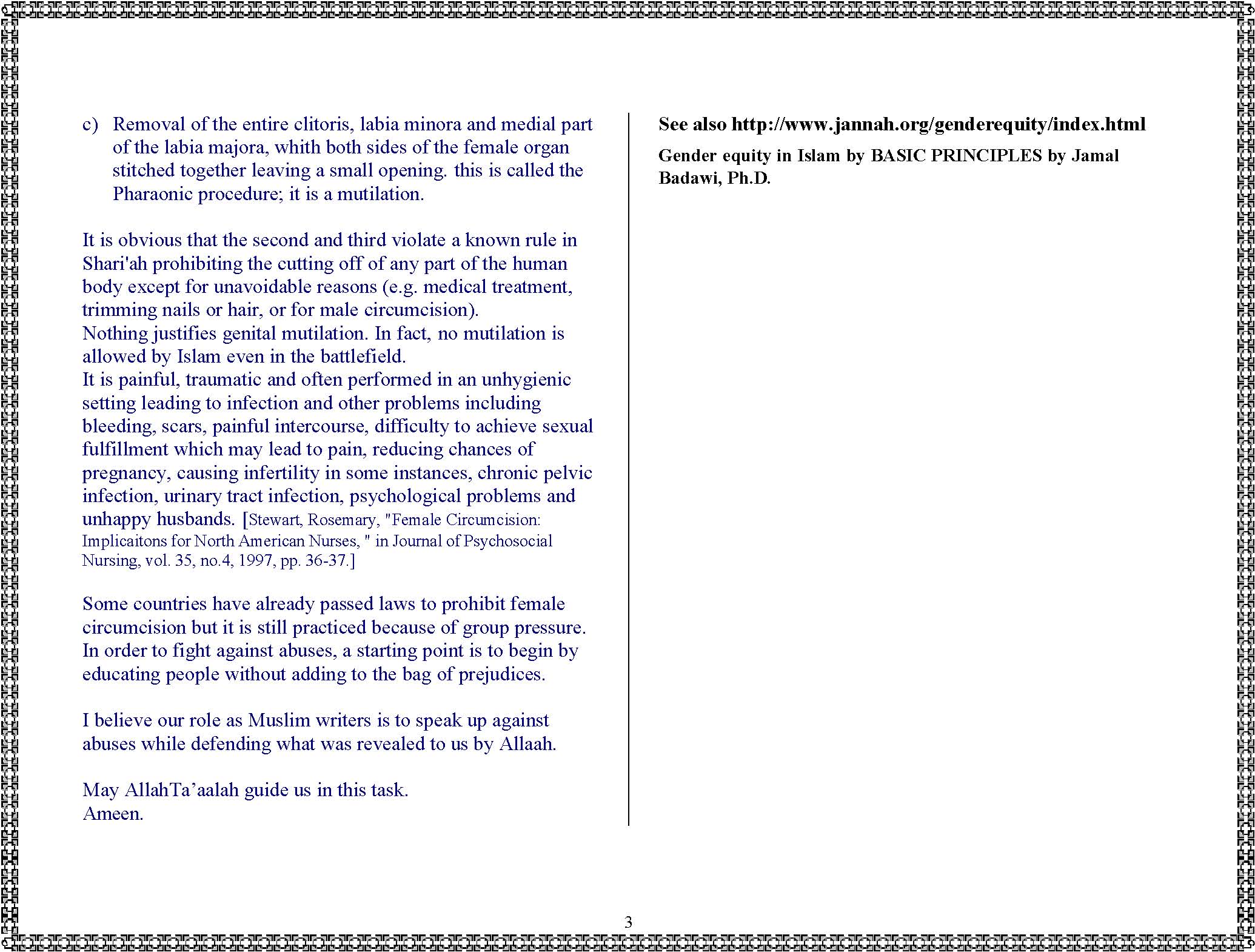
c) Removal of the entire clitoris, labia minora and medial part
of the labia majora, whith both sides of the female organ
stitched together leaving a small opening. this is called the
Pharaonic procedure; it is a mutilation.
It is obvious that the second and third violate a known rule in Shari'ah prohibiting the cutting off of any part of the human body except for unavoidable reasons (e.g. medical treatment, trimming nails or hair, or for male circumcision). Nothing justifies genital mutilation. In fact, no mutilation is allowed by Islam even in the battlefield. It is painful, traumatic and often performed in an unhygienic setting leading to infection and other problems including bleeding, scars, painful intercourse, difficulty to achieve sexual fulfillment which may lead to pain, reducing chances of pregnancy, causing infertility in some instances, chronic pelvic infection, urinary tract infection, psychological problems and unhappy husbands. [Stewart, Rosemary, "Female Circumcision: Implicaitons for North American Nurses, " in Journal of Psychosocial
Nursing, vol. 35, no.4, 1997, pp. 36-37.]
Some countries have already passed laws to prohibit female circumcision but it is still practiced because of group pressure. In order to fight against abuses, a starting point is to begin by educating people without adding to the bag of prejudices.
I believe our role as Muslim writers is to speak up against abuses while defending what was revealed to us by Allaah.
May AllahTa’aalah guide us in this task. Ameen.
See also http://www.jannah.org/genderequity/index.html
Gender equity in Islam by BASIC PRINCIPLES by Jamal Badawi, Ph.D.
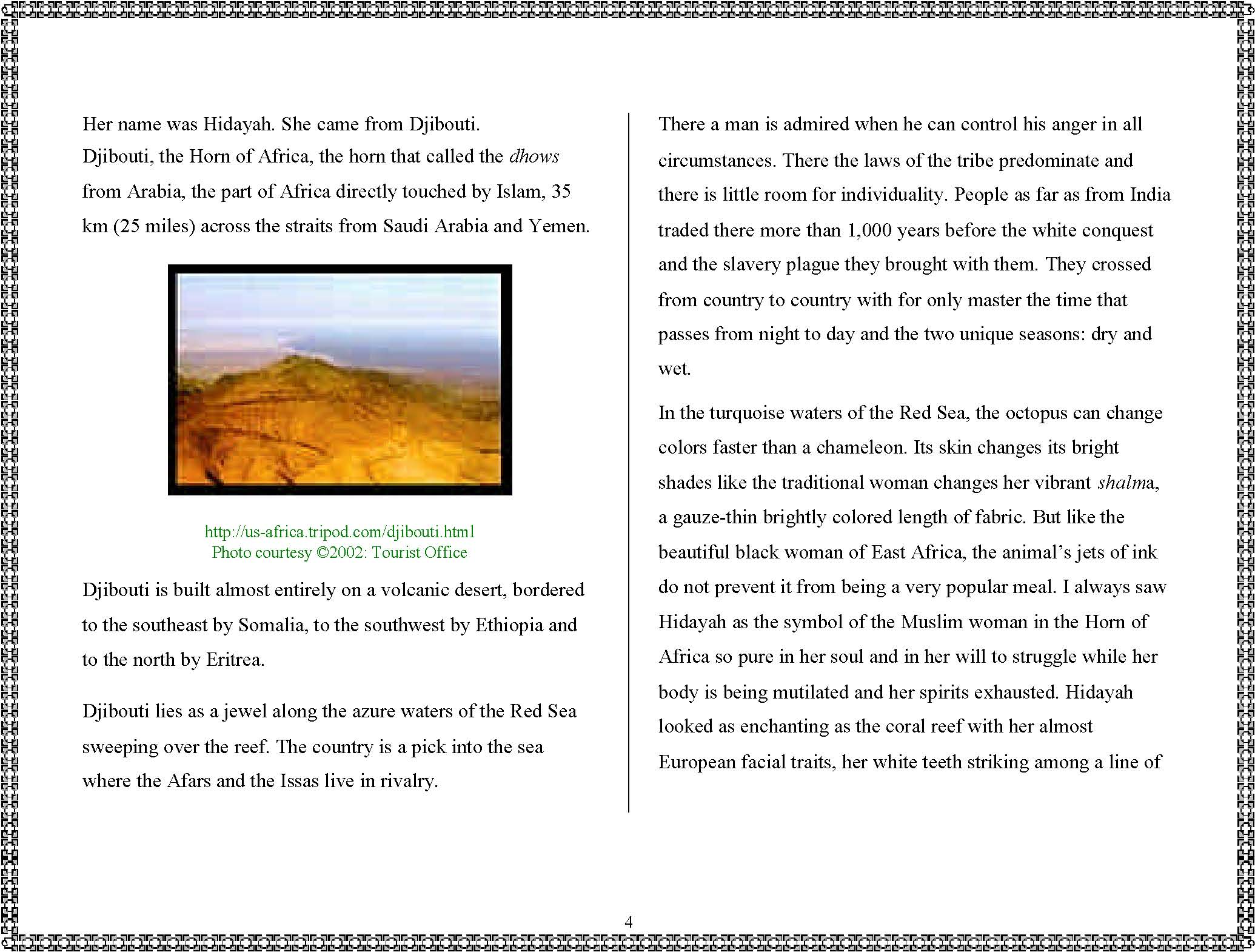
Her name was Hidayah. She came from Djibouti.
Djibouti, the Horn of Africa, the horn that called the dhows from Arabia, the part of Africa directly touched by Islam, 35 km (25 miles) across the straits from Saudi Arabia and Yemen.
http://us-africa.tripod.com/djibouti.html Photo courtesy ©2002: Tourist Office
Djibouti is built almost entirely on a volcanic desert, bordered to the southeast by Somalia, to the southwest by Ethiopia and to the north by Eritrea.
Djibouti lies as a jewel along the azure waters of the Red Sea sweeping over the reef. The country is a pick into the sea where the Afars and the Issas live in rivalry.
There a man is admired when he can control his anger in all circumstances. There the laws of the tribe predominate and there is little room for individuality. People as far as from India traded there more than 1,000 years before the white conquest and the slavery plague they brought with them. They crossed from country to country with for only master the time that passes from night to day and the two unique seasons: dry and wet.
In the turquoise waters of the Red Sea, the octopus can change colors faster than a chameleon. Its skin changes its bright shades like the traditional woman changes her vibrant shalma, a gauze-thin brightly colored length of fabric. But like the beautiful black woman of East Africa, the animal’s jets of ink do not prevent it from being a very popular meal. I always saw Hidayah as the symbol of the Muslim woman in the Horn of Africa so pure in her soul and in her will to struggle while her body is being mutilated and her spirits exhausted. Hidayah looked as enchanting as the coral reef with her almost European facial traits, her white teeth striking among a line of velvet lips, her broad eyes as shy and soft as a gazelle’s gaze and her pace as calm and appeasing as the trot of the camel.
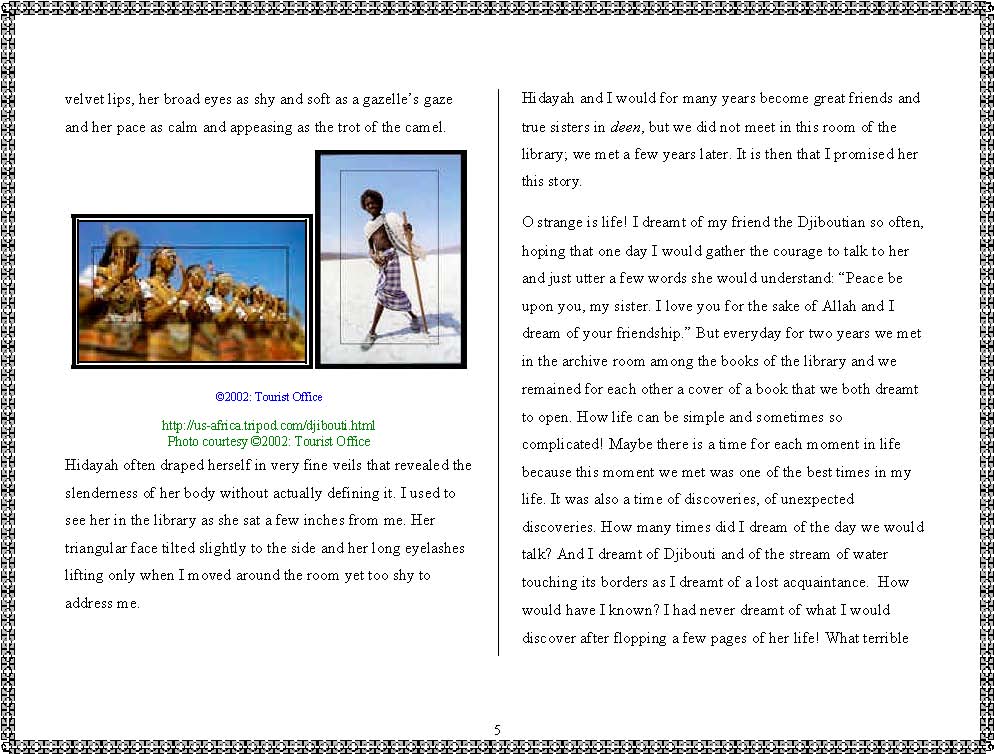
©2002: Tourist Office
http://us-africa.tripod.com/djibouti.html Photo courtesy ©2002: Tourist Office
Hidayah often draped herself in very fine veils that revealed the slenderness of her body without actually defining it. I used to see her in the library as she sat a few inches from me. Her triangular face tilted slightly to the side and her long eyelashes lifting only when I moved around the room yet too shy to address me.
Hidayah and I would for many years become great friends and true sisters in deen, but we did not meet in this room of the library; we met a few years later. It is then that I promised her this story.
O strange is life! I dreamt of my friend the Djiboutian so often, hoping that one day I would gather the courage to talk to her and just utter a few words she would understand: “Peace be upon you, my sister. I love you for the sake of Allah and I dream of your friendship.” But everyday for two years we met in the archive room among the books of the library and we remained for each other a cover of a book that we both dreamt to open. How life can be simple and sometimes so complicated! Maybe there is a time for each moment in life because this moment we met was one of the best times in my life. It was also a time of discoveries, of unexpected discoveries. How many times did I dream of the day we would talk? And I dreamt of Djibouti and of the stream of water touching its borders as I dreamt of a lost acquaintance. How would have I known? I had never dreamt of what I would discover after flopping a few pages of her life! What terrible
